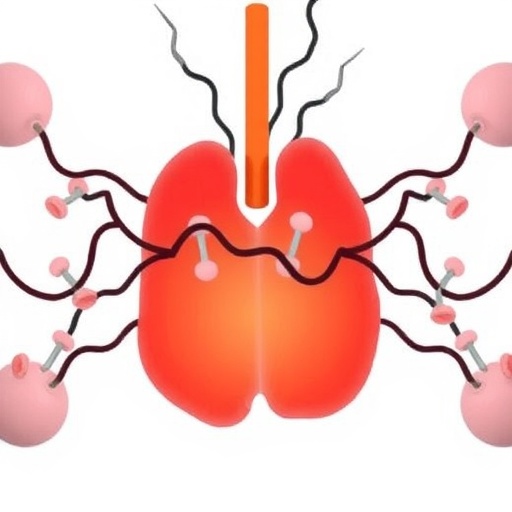In a groundbreaking study poised to reshape our understanding of major depressive disorder (MDD), scientists have uncovered striking imbalances in lipid metabolism that could offer new avenues for diagnosis and treatment. Through advanced lipidomic analyses, researchers have identified significant dysregulation in oxidized fatty acids (OxFAs) and acyl-carnitines (CARs), two critical lipid families, revealing a complex biochemical signature associated with this pervasive mental health condition.
Major depressive disorder, a condition affecting millions globally, has long been linked to disruptions in brain chemistry and function. However, emerging evidence points to a broader systemic dysfunction involving inflammation, oxidative stress, and metabolic irregularities. This latest study delves deep into the lipid composition of individuals diagnosed with MDD, suggesting that certain lipid species might serve as both biomarkers and therapeutic targets.
The research employed a robust case-control design involving 204 participants, of which 107 were diagnosed with MDD and 97 served as healthy controls. Using cutting-edge technology—the Ultimate 3000 ultra-high performance liquid chromatography (UHPLC) system paired with a Q-Exactive HF mass spectrometry (MS) platform—the team performed a meticulous lipidomic profiling of serum samples. This high-resolution analytical approach allowed for an unprecedented detection and quantification of various oxidized fatty acids and acyl-carnitines.
Crucially, the data processing phase utilized MetaboAnalyst 5.0, specialized online software that facilitated comprehensive multi-variant analyses. Strict statistical criteria, including a false discovery rate (FDR)-adjusted p-value threshold of less than 0.05, a variable importance projection (VIP) score greater than 1.5, and fold change values beyond ±2, helped isolate 40 lipids exhibiting significant alterations in the MDD cohort compared to healthy controls.
Among these lipids, an intriguing pattern emerged: 11 distinct oxidized fatty acids were elevated in individuals with depression, while 5 other OxFAs showed marked decreases. This split reveals a nuanced lipidomic disturbance, indicating that oxidative modifications of fatty acids are not uniformly upregulated or downregulated, but instead dysregulated in a complex manner that may affect cellular signaling, inflammation, and neuroplasticity.
Equally compelling was the observation concerning acyl-carnitines—lipids involved in mitochondrial fatty acid transport and energy metabolism. The study found a pronounced reduction in 8 types of CARs, primarily those with singular carbon chain structures, implying compromised mitochondrial function or altered fatty acid oxidation processes. Contrarily, 3 CAR species with numerical carbon chain patterns were elevated, suggesting selective metabolic adaptations or compensatory mechanisms at play in MDD pathology.
Beyond biochemical discovery, the practical implications of these findings were validated through receiver operating characteristic (ROC) curve analysis, which demonstrated the capacity of lipid profiles—especially OxFAs—to differentiate between MDD patients and healthy controls with high accuracy. This discovery heralds a future where blood-based lipid biomarkers might augment or even revolutionize the clinical diagnosis of major depressive disorder, traditionally reliant on subjective symptom assessments.
From a clinical neuroscience perspective, the observed lipid disturbances may also provide critical insights into the pathophysiological underpinnings of MDD. Oxidized fatty acids are known modulators of inflammation and oxidative stress, both of which are implicated in depression’s neurobiology. Meanwhile, acyl-carnitines play vital roles in mitochondrial energy production, and their dysregulation may contribute to the cognitive and affective deficits characteristic of MDD by impairing neuronal energy metabolism.
The study further opens a tantalizing therapeutic window, suggesting that supplementation strategies targeting polyunsaturated fatty acids (PUFAs) and acyl-carnitines deserve rigorous exploration. Administering specific lipid species or precursors might restore metabolic homeostasis and alleviate depressive symptoms, though the authors caution that precise formulation and dosing require careful scrutiny to avoid unintended consequences.
As compelling as these findings are, the researchers emphasize prudence when interpreting and generalizing their results. The single-center, cross-sectional design warrants replication through longitudinal and multi-center studies to firmly establish causal relationships. In addition, the intricate interplay of lipid metabolism with genetic, environmental, and lifestyle factors in depression remains to be unraveled.
This study also highlights the power of lipidomics—a rapidly evolving field blending analytical chemistry and systems biology—to illuminate previously hidden aspects of neuropsychiatric disorders. By interrogating thousands of lipid species simultaneously, researchers can map distinct metabolic signatures that reflect both disease states and response to interventions, potentially ushering in a new era of personalized psychiatry.
While the current investigation focuses on blood-based biomarkers, the integration of lipidomic data with brain imaging, genomics, and clinical phenotyping could yield multidimensional models of depression. Such integrative approaches promise to refine patient stratification, predict treatment response, and guide the development of novel pharmacotherapies targeting metabolic pathways.
In summary, this landmark lipidomic analysis offers unprecedented insights into the molecular landscape of major depressive disorder, charting a path forward for biomarker discovery and innovative treatments. By revealing the dual dysregulation of oxidized fatty acids and acyl-carnitines, the study enriches our understanding of the metabolic disruptions underlying depression and sparks new hope for combating this debilitating illness.
As the scientific community continues to unravel the biochemical underpinnings of mental health, studies like this underscore the necessity of multidisciplinary research—blending psychiatry, metabolomics, and molecular biology—to break new ground in diagnosing, monitoring, and ultimately treating major depressive disorder.
Subject of Research: Dysregulation of lipid metabolism, specifically oxidized fatty acids and acyl-carnitines, in major depressive disorder.
Article Title: Lipidomic analyses reveal the dysregulation of oxidized fatty acids (OxFAs) and acyl-carnitines (CARs) in major depressive disorder: a case-control study.
Article References:
He, L., Duan, N., Wang, C. et al. Lipidomic analyses reveal the dysregulation of oxidized fatty acids (OxFAs) and acyl-carnitines (CARs) in major depressive disorder: a case-control study.
BMC Psychiatry 25, 752 (2025). https://doi.org/10.1186/s12888-025-07191-7
Image Credits: AI Generated




